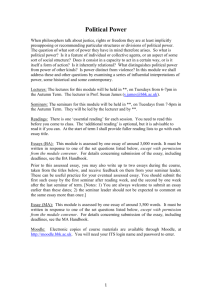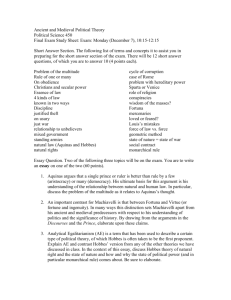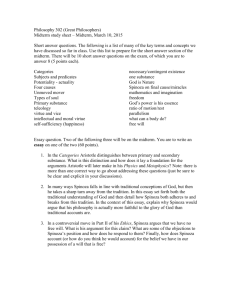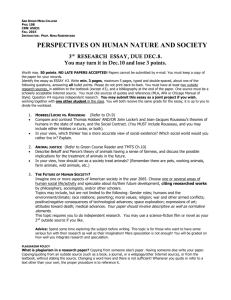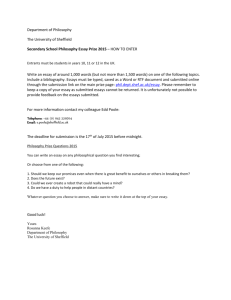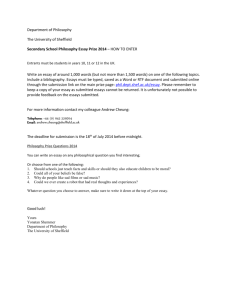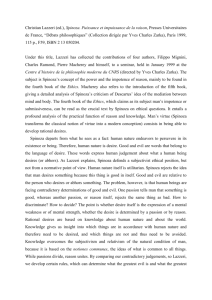Political Power
advertisement
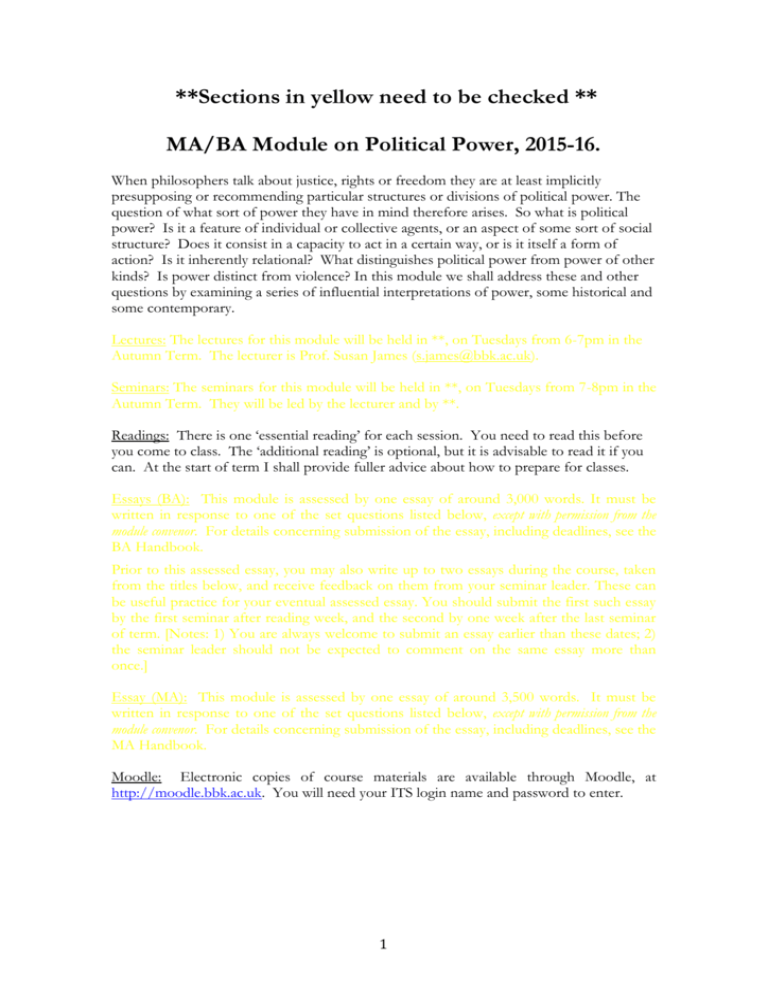
**Sections in yellow need to be checked ** MA/BA Module on Political Power, 2015-16. When philosophers talk about justice, rights or freedom they are at least implicitly presupposing or recommending particular structures or divisions of political power. The question of what sort of power they have in mind therefore arises. So what is political power? Is it a feature of individual or collective agents, or an aspect of some sort of social structure? Does it consist in a capacity to act in a certain way, or is it itself a form of action? Is it inherently relational? What distinguishes political power from power of other kinds? Is power distinct from violence? In this module we shall address these and other questions by examining a series of influential interpretations of power, some historical and some contemporary. Lectures: The lectures for this module will be held in **, on Tuesdays from 6-7pm in the Autumn Term. The lecturer is Prof. Susan James (s.james@bbk.ac.uk). Seminars: The seminars for this module will be held in **, on Tuesdays from 7-8pm in the Autumn Term. They will be led by the lecturer and by **. Readings: There is one ‘essential reading’ for each session. You need to read this before you come to class. The ‘additional reading’ is optional, but it is advisable to read it if you can. At the start of term I shall provide fuller advice about how to prepare for classes. Essays (BA): This module is assessed by one essay of around 3,000 words. It must be written in response to one of the set questions listed below, except with permission from the module convenor. For details concerning submission of the essay, including deadlines, see the BA Handbook. Prior to this assessed essay, you may also write up to two essays during the course, taken from the titles below, and receive feedback on them from your seminar leader. These can be useful practice for your eventual assessed essay. You should submit the first such essay by the first seminar after reading week, and the second by one week after the last seminar of term. [Notes: 1) You are always welcome to submit an essay earlier than these dates; 2) the seminar leader should not be expected to comment on the same essay more than once.] Essay (MA): This module is assessed by one essay of around 3,500 words. It must be written in response to one of the set questions listed below, except with permission from the module convenor. For details concerning submission of the essay, including deadlines, see the MA Handbook. Moodle: Electronic copies of course materials are available through Moodle, at http://moodle.bbk.ac.uk. You will need your ITS login name and password to enter. 1 Week 1: Conceptual Maps and Problems Steven Lukes, Power: A Radical View, 2nd edition (Palgrave, 2007), ch. 1. Additional reading: Barry Hindess, Discourses of Power from Hobbes to Foucault (Blackwell, 1996), Introduction. Week 2: Maintaining Power: Niccolo Machiavelli Niccolo Machiavelli, The Prince (many editions.) Additional reading: Filippo del Lucchese, The Political Philosophy of Niccolo Machiavelli, Ch. 4. Erica Benner, Machiavelli’s Prince: A New Reading (Oxford University Press, 2013), pp. 9-29. Week 3: Sovereign Power I: Thomas Hobbes Thomas Hobbes, Leviathan (many editions - I recommend the one edited by E. Curley and published by Hackett), chs. 10, 13-19. Additional Reading: Quentin Skinner, ‘Hobbes on Representation’, European Journal of Philosophy 13 (2005), pp. 155-84. Week 4: Sovereign Power II: Benedict de Spinoza Benedict de Spinoza, Political Treatise trans. S. Shirley (Hackett, 2000), chs. 2 and 3. Additional Reading: Moira Gatens, ‘Spinoza’s Disturbing Thesis. Power, Norms and Fiction in the Tractatus Theologico-Politicus’, History of Political Thought , 30.3 (2009), 455-68. Week 5: Contested Power: Karl Marx Karl Marx, The Communist Manifesto Additional Reading: Nancy Holstrom, ‘Exploitation’ Canadian Journal of Philosophy 7.2 (1977). READING WEEK Week 6: Diversification of Power: Max Weber Max Weber, ‘Basic Categories of Social Organisation’ and ‘Class, Status Groups and Parties’ in W. G. Runciman ed., Weber: Selections in Translation (Cambridge University Press, 1978). Additional Reading: Wolfgang Mommsen, ‘The theory of the “three pure types of legitimate domination” and the concept of plebiscitarian democracy’ in The Age of Bureaucracy (Blackwell, 1974). 2 Week 7: Power and Violence Hannah Arendt, ‘On Violence’ in Crises of the Republic (various editions). Additional reading: George Kateb, Political Action: its nature and advantages’ in Dana Villa ed. The Cambridge Companion to Hannah Arendt (Cambridge University Press, 2000). Week 8: Foucault on Discipline Michel Foucault, Discipline and Punish. The Birth of the Prison, trans. Alan Sheridan (London: Penguin Books, 1977), Part 3. Additional reading: Michel Foucault, ‘The Subject and Power’ trans. Leslie Sawyer, in Power: Essential Works vol. 3 ed. J. Faubion, 326-248. Week 9: Foucault on Techniques of the Self Michel Foucault, The History of Sexuality, vol 3: Care of the Self, Introduction. Additional Reading: Martin Saar, ‘Genealogy and Subjectivity’, European Journal of Philosophy 10 (2002), 231-145. Week 10: Power and Gender Chantal Mouffe, The Return of the Political (Verso, 2005), ch. 5. Additional reading: Wendy Brown, ‘Finding the Man in the State’, in States of Injury (Princeton University Press, 1995), pp. 166-96. Essay Questions 1. Explain and assess Machiavelli’s account of the relation between morality and political power. See the essential and additional reading for week 2 and: Quentin Skinner, Machiavelli Erica Benner, Machiavelli’s Prince, chapters 16-18. Cary Nederman, ‘Machiavelli and Moral Character: Principality, Republic and the Psychology of Virtu’, History of Political Thought 21 (2000), 349-64. Virginia Cox, ‘Rhetoric and Ethics in Machiavelli’ in John Najemi ed., The Cambridge Companion to Machiavelli 2. Assess Hobbes’s argument for his claim that a multitude of individuals can only act when a sovereign represents their will? See the essential and additional reading for week 3 and: Barry Hindess, Discourses of Power: from Hobbes to Foucault, ch. 2. 3 David Runciman, ‘What Kind of Person is Hobbes’s State? A Reply to Skinner,’ Journal of Political Philosophy 8 (2000), 268-78. Quentin Skinner, ‘Hobbes on Representation’, European Journal of Philosophy 13 (2005), pp. 155-84. Quentin Skinner, ‘Hobbes on Persons, Authors and Representatives’ in The Cambridge Companion to Leviathan ed. Patricia Springborg. Richard Tuck, Philosophy and Government 1575-1621, ch. 7. 3. Critically discuss Spinoza’s account of the relation between power and political power. See the essential and additional reading for week 4 and: Benedict Spinoza, Theologico-Political Treatise, ed. Jonathan Israel, chs. 16 and 17. Justin Steinberg, ‘Spinoza’s Political Philosophy’ Stanford Encyclopaedia of Philosophy, http://plato.stanford.edu/archives/spr2009/entries/spinoza-political/ Etienne Balibar, Spinoza and Politics, chs. 3 and 5. Moira Gatens and Genevieve Lloyd, Collective Imaginings: Spinoza Past and Present, chs. 4 and 5. Susan James, Spinoza on Philosophy, Religion and Politics: The Tractatus Theologico-Politicus (OUP, 2012), chs. 10 and 11. 4. How, according to Marx, does ideology serve to maintain the domination of the ruling class? Is his account persuasive? See the essential and additional reading for week 5 and: Steven Lukes, Power: A Radical View, chapter 3. Allen Wood, Karl Marx, ch. 10. Michael Rosen, Voluntary Servitude, ch. 6. Etienne Balibar, ‘What is state power?’ in On the Dictatorship of the Proletariat Raymond Guess, History and Illusion in Politics, pp. 43-52 Joseph Femia, Gramsci’s Political Thought. Hegemony, Consciousness and the Revolutionary Process. Judith Butler, The Psychic Life of Power, Introduction and Ch. 4. 5. Assess Foucault’s contribution to our understanding of political power. See the essential and additional reading for weeks 6 and 7 and: Michel Foucault, Discipline and Punish (the rest of the text). Michel Foucault, The Care of the Self (the rest of the text) Michel Foucault, ‘Truth and Power’ trans Colin Gordon, in Power: Essential Works vol. 3 ed. J. Faubion, 111-133. Steven Lukes, Power: A Radical View, ch. 2. James Tully, ‘To Think and Act Differently. Comparing critical theory and critical ethos’ in Public Philosophy in a New Key, vol. 1, Democracy and Civic Freedom, ch. 3. James Tully, ‘Philosophy as a Critical Activity’, Political Theory, 2002. http://ptx.sagepub.com/cgi/reprint/30/4/533.pdf William Connolly, ‘Beyond Good and Evil. The Ethical Sensibility of Michel Foucault,’ Political Theory 21 (1993), pp. 365-89. 6. Is there a defensible distinction between violence and power? See the essential and additional reading for Weeks 8 and 9 and: Hannah Arendt, ‘What is Authority’ in Between Past and Future 4 Paul Ricoeur, ‘Power and Violence’, Theory, Culture & Society September 2010 vol. 27 no. 5 1836 Franz Fanon, Concerning Violence Margaret Canovan, Hannah Arendt. A reinterpretation of her political thought , ch. 2. Jurgen Habermas, ‘Hannah Arendt’s Communications Concept of Power’ in Social Research 44 (1977), reprinted in Hinchman and Hinchman eds. Hannah Arendt: Critical Essays. Bonnie Honig, ‘Arendt’s accounts of action and authority’ in Political Theory and the Displacement of Politics Elizabeth Fraser and Kimberley Hutchings, ‘Avowing Violence’, Philosophy and Social Criticism 2011 vol. 37 no. 1, 3-23. Johanna Oksala, Foucault, Politics and Violence. 7. In what sense and how far can the sovereign be described as masculine? (Please do not choose this essay if you are also taking the module on Gender and Philosophy.) See essential and additional reading for week 10 and Genevieve Lloyd, The Man of Reason Bonnie Mann, Sovereign Masculinity (OUP, 2014; available at OSO) Iris Marion Young, Justice and the Politics of Difference, ch. 2. Anne Phillips, The Politics of Presence Judith Squires, Gender in Political Theory, chapters 1 and 6. 5
